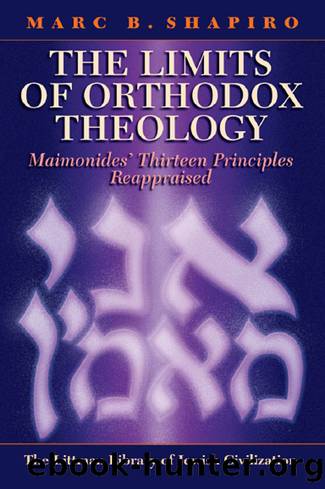The Limits of Orthodox Theology by Shapiro Marc B.;

Author:Shapiro, Marc B.;
Language: eng
Format: epub
Publisher: Liverpool University Press
It is possible that some of the scholars we have quoted understood this passage as condemning, not the denial of complete Mosaic authorship, but the denial of divine inspiration. That is, what the Talmud regards as heresy is the assertion that Moses composed the Torah on his own, without receiving it from God.160 Yet once the Torahâs divinity is acknowledged, it is not heretical to posit that some verses were revealed to post-Mosaic prophets. Indeed, the Mishnah includes in its list of heretics âhe who says that the Torah is not from Heavenâ.161 In other words, the stress is on the divine origin of the Torah, not on whether Moses alone received the revelation.
To be sure, there are a number of rabbinic sources that mention that Moses said (and did) certain things mipi atsmo (of his own accord), without having been commanded to do so by God.162 One famous talmudic passage states that the curses in Deuteronomy were offered by Moses of his own accord.163 There is even a zoharic statement that Moses composed the entire book of Deuteronomy on his own.164 Whatever their original meaning(s), which are far from clear and, as Heschel has shown, may reflect a variety of views, as far as later rabbinic authorities were concerned, passages such as these were not regarded as relevant to the issue discussed here, and thus were not seen as contradicting the passage in Sanhedrin cited above. These authorities have always stressed that when these portions, originally stated independently by Moses, were later included as part of the Torah given to the Children of Israel, it was done at Godâs direction. This, and only this, is what sanctified the text.165
Nevertheless, despite this explanation we still find views that seem to contradict Maimonidesâ Principle. For example, in discussing the talmudic view that the curses in Deuteronomy originated with Moses, not God, R. Nissim Gerondi writes: âGod agreed that they be written in the Torah.â166 It is hard to see how this approach, in which God is no longer directing but concurring, can be brought in line with Maimonidesâ insistence that the entire Torah was prophetically revealed. Even if one asserts that Godâs prophetic concurrence satisfies Maimonidesâ Principle, R. Nissimâs comment still seems to contradict another of Maimonidesâ statements, namely that, upon receiving the revelation, Moses âacted as a scribe to whom one dictates and who writes all of it including its chronicles, its narratives, and its commandmentsâ. Yet according to R. Nissim, this was not the case with regard to the curses, since here God simply permitted Moses to include his own curses in the Torah.
It is possible that R. Nissimâs view was anticipated in the following passage from Shemot rabah:167
Another explanation for Write thou these words (Exod. 34: 27): The angels began to say before the Holy One, blessed be He: âDost Thou grant permission to Moses to write down anything he wishes, so that he may then say unto Israel, âI have given the Torah to you and it
Download
This site does not store any files on its server. We only index and link to content provided by other sites. Please contact the content providers to delete copyright contents if any and email us, we'll remove relevant links or contents immediately.
| Haggadah | Hasidism |
| History | Holidays |
| Jewish Life | Kabbalah & Mysticism |
| Law | Movements |
| Prayerbooks | Sacred Writings |
| Sermons | Theology |
| Women & Judaism |
The Secret Power of Speaking God's Word by Joyce Meyer(2754)
Man's Search for Meaning by Viktor E. Frankl(2556)
Mckeown, Greg - Essentialism: The Disciplined Pursuit of Less by Mckeown Greg(2333)
MOSES THE EGYPTIAN by Jan Assmann(2276)
Devil, The by Almond Philip C(2205)
Unbound by Arlene Stein(2180)
The Complete Dead Sea Scrolls in English (7th Edition) (Penguin Classics) by Geza Vermes(2136)
I Capture the Castle by Dodie Smith(1905)
Schindler's Ark by Thomas Keneally(1763)
The Invisible Wall by Harry Bernstein(1709)
The Gnostic Gospel of St. Thomas by Tau Malachi(1680)
The Bible Doesn't Say That by Dr. Joel M. Hoffman(1608)
The Secret Doctrine of the Kabbalah by Leonora Leet(1527)
Political Theology by Carl Schmitt(1503)
The Jewish State by Theodor Herzl(1470)
A History of the Jews by Max I. Dimont(1441)
The Dead Sea Scrolls Bible by Martin G. Abegg(1427)
The Book of Separation by Tova Mirvis(1420)
Oy!: The Ultimate Book of Jewish Jokes by David Minkoff(1293)
